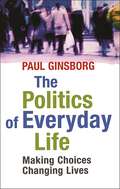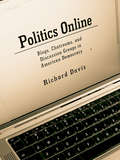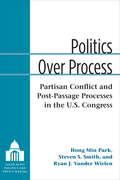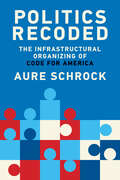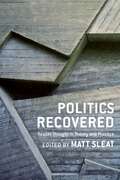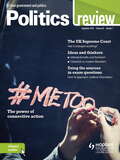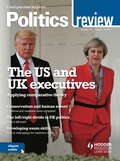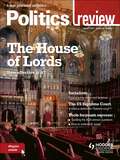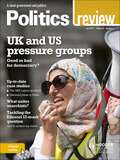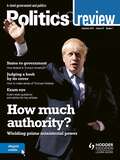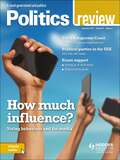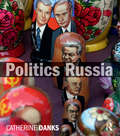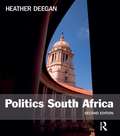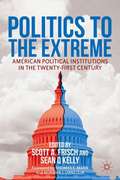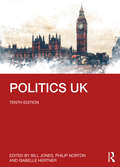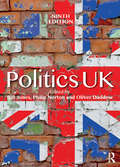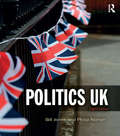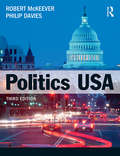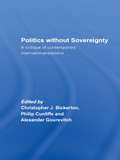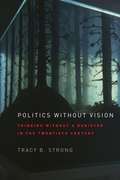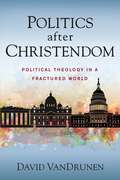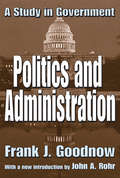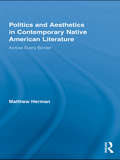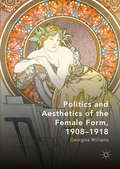- Table View
- List View
Politics Of Everyday Life: Making Choices Changing Lives
by Ginsborg, PaulConcern over the present state of the world -its tensions and disparities- fosters in many people the uneasy combination of two sensations: urgency and powerlessness. The solution lies in our own hands. We need to re-think the choices we make on a day-to-day basis, choices affecting the ways we use our time, the family lives we live, the sorts of goods and services we consume, the quality of democracy we are able to exercise. The individual, the local and the global are inextricably intertwined, in positive and in negative ways. Passivity and indifference at the individual level contribute greatly to collective dismay at the condition of the world. This book explores the choices we have. It considers the options for civil society, and for the individual within today's political culture.
Politics Online: Blogs, Chatrooms, and Discussion Groups in American Democracy
by Richard DavisDespite the growth of various forms of online discussion, their impact on American political life is only beginning to be examined systematically. In Politics Online Richard Davis provides a thorough analysis detailing the political attitudes, behavior, and demographic nature of the electronic discussion community contrasting that community with the general public.
Politics Over Process: Partisan Conflict and Post-Passage Processes in the U.S. Congress
by Hong Min Park Steven S Smith Ryan J Vander WielenAlthough the U.S. Constitution requires that the House of Representatives and the Senate pass legislation in identical form before it can be sent to the president for final approval, the process of resolving differences between the chambers has received surprisingly little scholarly attention. Hong Min Park, Steven S. Smith, and Ryan J. Vander Wielen document the dramatic changes in inter-cameral resolution that have occurred over recent decades, and examine the various considerations made by the chambers when determining the manner in which the House and Senate pursue conciliation. Politics Over Process demonstrates that partisan competition, increasing party polarization, and institutional reforms have encouraged the majority party to more creatively restructure post-passage processes, often avoiding the traditional standing committee and conference processes altogether.
Politics Recoded: The Infrastructural Organizing of Code for America (The Information Society Series)
by Aure SchrockThe first detailed history of Code for America that examines how democratically designed government systems can collectively improve technology&’s impact on society.For decades, tens of thousands of volunteers and employees of Code for America have taken a different path to institutional change: through designing and implementing infrastructure. In Politics Recoded, Aure Schrock employs a robust, organizational ethnography to analyze how Code for America&’s infrastructural organizing changed how politics get exercised, showing how we citizens can work directly with the government on projects to improve our collective livelihoods. Drawing from theories of organizing, social infrastructure, racialized organizations, technical cultures, and intersectionality, Schrock argues that our &“post-techlash society&” must no longer presume that corporate platforms or social networks can level social inequities.An underrecognized yet influential organization, Code for America emerged from a tech culture background that prioritized networks and publicity over the long, slow work of institutional change. But its evolution demonstrates how to push beyond the fundamental flaws of tech-forward organizing. This, the first history of Code for America, shows how promoting agentic citizenship and brokering in empathy let the organization influence policy at all levels of government—and demonstrates why we need to bolster institutions to ensure that everyone is justly represented and receiving the benefits. Appealing to those in political science, communication, and information studies, Politics Recoded will empower practitioners and activists to revolutionize technological design and participate in alternative forms of civic engagement.
Politics Recovered: Realist Thought in Theory and Practice
by David Owen Richard Bellamy Michael Freeden Duncan Bell William A. Galston Glen Newey Rahul Sagar Mark Philp Charles Larmore John Medearis Elizabeth Frazer Matt Sleat Alison McQueen Paul Sagar William ScheuermanIs political theory political enough? Or does a tendency toward abstraction, idealization, moralism, and utopianism leave contemporary political theory out of touch with real politics as it actually takes place, and hence unable to speak meaningfully to or about our world? Realist political thought, which has enjoyed a significant revival of interest in recent years, seeks to avoid such pitfalls by remaining attentive to the distinctiveness of politics and the ways its realities ought to shape how we think and act in the political realm.Politics Recovered brings together prominent scholars to develop what it might mean to theorize politics “realistically.” Intervening in philosophical debates such as the relationship between politics and morality and the role that facts and emotions should play in the theorization of political values, the volume addresses how a realist approach aids our understanding of pressing issues such as global justice, inequality, poverty, political corruption, the value of democracy, governmental secrecy, and demands for transparency. Contributors open up fruitful dialogues with a variety of other realist approaches, such as feminist theory, democratic theory, and international relations. By exploring the nature and prospects of realist thought, Politics Recovered shows how political theory can affirm reality in order to provide meaningful and compelling answers to the fundamental questions of political life.
Politics Review Magazine Volume 28, 2018/19 Issue 1
by Hodder Education MagazinesThis A-level politics magazine provides up-to-date articles specially written for students to help them gain their highest grade. As well as articles covering UK, US and global politics, there is coverage of political ideas and thinkers, and advice on approaching different exam questions including structuring essays.ContentsThe UK Supreme Court: has it changed anything? Katie Shapiro Exam success AQA A-level Politics: tackling the 9-mark questions Emma Kilheeney Ideas and thinkers Intersectionality and feminism Maria Egan First past the post: is it still fit for purpose? Matt Walker English local elections 2018: a cautious stalemate? Rob Murphy Does the US Constitution still work? Anthony J. Bennett Exam eye Does the US Constitution still work? Emma Kilheeney Ideas and thinkers Classical vs modern liberalism David Tuck Debate Has Donald Trump restored the imperial presidency? Kay Moxon and Clare Stansfield Comparative politics: political parties in the UK and USA Simon Lemieux Exam success Edexcel and AQA A-level Politics: using the sources Sarra Jenkins Focus on... #MeToo Rowena Hammal
Politics Review Magazine Volume 28, 2018/19 Issue 2
by Hodder Education MagazinesUK party politics: the return of the left/right divide?Andrew HeywoodExam eyeUK party politicsEmma KilheeneyIdeas and thinkersConservative views on human natureDavid TuckComparative politics: UK and US judiciaries comparedToby CooperStretch and challengePolitics and God: why politicians need to be religiously literateMark GoodmanSelect committeesMark ChestertonThe US Congress: how effective is it?Edward AshbeeExam successExamination skills: an essential guideJessica HardyComparative politics: UK and US executives comparedLouis SugdenDebateDoes economic globalisation create prosperity for all?John Jefferies and Shaun TownsendThe UK constitution: how successful have recent reforms been?Andrew MilfordFocus on...Direct actionRowena Hammal
Politics Review Magazine Volume 28, 2018/19 Issue 3
by Hodder Education MagazinesContents Is there a distinctive 'Roberts court'? Toby CooperExam eye Is there a distinctive 'Roberts court'?Emma KilheeneyExam success How to write an A* essaySarra JenkinsThe House of Lords todayPhilip NortonDebate Is the era of bipartisanship in the USA over?Anthony J. Bennett and Simon LemieuxThe 2018 mid-term electionsSimon LemieuxSocialismMoyra GrantStretch and challenge Voting behaviour: how do voters decide in elections?Matthew QvortrupIs US hegemony under threat?Josie GadsbyExam success AQA A-level Politics: tackling the extract questionNick AxonComparative politics: civil rights in the UK and USAMike DawkinsFocus on The future of the nation-stateLaurie Huggett-Wilde
Politics Review Magazine Volume 28, 2018/19 Issue 4
by Hodder Education MagazinesContents President Trump at half-time: how is he doing?Robert SinghUK pressure groups and democracyAdam TomesDebate Is the United Nations unfit for purpose and in need of reform?Josie Gadsby and Rob MurphyComparative politics: campaign finance in the USA and UKSimon LemieuxThe legitimacy of the EUDavid TuckCase study Devolution in Wales: an insider's guide to devolved powersTim ErasmusAnarchism: unity within diversity?Simon LemieuxElections The 1997 general election: why was Labour's win so big?Laurie Huggett-WildeUS pressure groups: what is their impact on the democratic process?Andrew ColcloughIdeas and thinkers The nationalism of Marcus GarveyPaul FloydExam success Edexcel A-level Politics: tackling the 12-mark questionJohn JefferiesFocus on... The rise of populismNick Gallop
Politics Review Magazine Volume 29, 2019/20 Issue 1
by Hodder Education MagazinesWhat determines the prime minister's power? Toby CooperExam eye: What determines the prime minister's power? Ben FullerThe complexities of human rights John JefferiesExam success: Comparative politics and theoretical approaches Simon LemieuxAre referendums the best form of democracy? Nick GallopLeviathan by Thomas HobbesDavid TuckIdeas and thinkers: Liberalism and natural rights Jessica HardyExam eye: Liberalism and natural rights Maria EganHow federal is Trump's America? Anthony J. BennettDebate: Who should make the law - judges or elected representatives? Louis Sugden and Matt WalkerComparative politics: Congress vs Parliament Andrew MilfordExam eye: Congress vs Parliament Nick AxonCase study: The US Supreme Court: too powerful and too political? Emma KilheeneyFocus on...: The three strands of ecology David Tuck
Politics Review Magazine Volume 29, 2019/20 Issue 2
by Philip Allan MagazinesContents: Ten years of the UK Supreme Court Maria EganIdeas and thinkers: Ayn Rand and American conservatism Steve DaviesWhy do US political parties still matter? Simon LemieuxExam eye: How polarised are US political parties? Chris WilkinsonGlobal governance and the environment Josie GadsbyThe UK Supreme Court: key cases David TuckExam success: How to write an A* essay in AQA exams Emma KilheeneyThe media and voting behaviour Rowena HammalDebate: Is nationalism defined by race? Moyra Grant and Paul FloydCase study: The role and power of the Scottish Parliament Clare StansfieldComparing UK and US pressure groups Mike DawkinsExam eye: Comparing UK and US pressure groups Katie ShapiroExam success: Edexcel study guide Paul FloydFocus on... Multiculturalism Richard Kelly
Politics Russia
by Catherine DanksPolitics Russia provides the most comprehensive, accessible and up-to-date introduction to all aspects of the political development of Russia in the post-communist era. Writing with the undergraduate student specifically in mind, Danks' fluent style and masterly grasp of complex material will make this an indispensable guide for many years to come.Divided into five sections, Politics Russia maps a clear path towards an understanding of Russia and its politics in the twenty first century. In Part One the emergence of contemporary Russia is put into context by a consideration of the end of the USSR and the move towards democratization under Gorbachev. Part Two provides a clear-sighted and stimulating overview of the nature of the executive and the legislature in contemporary Russia. Part Three examines civil society, the role of the media and the representative process. Part Four is focussed on the policy process, from foreign and defence policies to the development of domestic social policies from the provision of healthcare to education. Part Five, the final, provides an overall consideration the contemporary state of Russia, examining the development from Yeltsin, to Putin to Medvedev, and considers the possible futures of the region. The book is supported by a host of pedagogical features, including: Annotated further reading lists Definitions of key political terms Short biographies of key figures
Politics South Africa
by Heather DeeganSouth Africa's democratic transformation in 1994 captured the attention of the international community. Politics: South Africa provides an acute appraisal of the critical moments in the history of South Africa, and examines the political environment in the years following the shift to democracy. Under the leadership of the revered figure of Nelson Mandela, the 'rainbow nation' achieved the transition with less violence than had been feared. A new generation of post-Apartheid young people has grown up, and the socio-political environment is maturing. However, the country still has immense challenges to overcome, in delivering services to its diverse populations faced with the impact of HIV/AIDS on communities and the economic demands of development. This fully-revised second edition includes two entirely new chapters based on the author's recent research and interviews within the country, dealing with the legacy of the President Mbeki years, the implications of the 2009 election, and the challenges now facing the country under Jacob Zuma. Politics: South Africa is an accessible guide for students, and a fascinating appraisal of a nation which has travelled a long journey but is still trying to reconcile its past. Features include:- boxed discussions of key subject areas- chronology of important events- maps- appendices of critical documents and speeches Dr Heather Deegan is a Reader in Comparative Politics at Middlesex University, London. She was a Fellow of the Africa Institute of South Africa, Pretoria and was a Visiting Lecturer at the University of Witwatersrand. She is the author of six books including the recently published Africa Today: Culture, Economics, Religion, Security (2009).
Politics To The Extreme
by Scott A. Frisch Sean Q KellyTo overcome the political deadlock that overshadows the pressing problems facing the United States, the academies top scholars address the causes and consequences of polarization in American politics, and suggest solutions for bridging the partisan divide.
Politics UK
by Bill JonesThis revised and updated tenth edition of the bestselling textbook Politics UK is an indispensable introduction to British politics. It provides a thorough and accessible overview of the institutions and processes of British government, an excellent grounding in British political history and an incisive introduction to the issues and challenges facing Britain today. This edition welcomes three brand new chapters - ‘Elites in the United Kingdom’, 'Gender and British politics' and 'UK Immigration policy in hostile environment' - alongside rigorously updated revised chapters. It delivers excellent coverage of contemporary events, with significant new material covering: the Johnson premiership and the national challenge of Covid-19, the end of the May premiership and the implementation of Brexit, the Labour Party’s transition from Corbyn to Starmer, infrastructure and innovation, 'fake news', populism and nationalism, the UK’s place in a post-Brexit world, climate change, social mobility and elite recruitment, devolution and regionalism, constitutional strain, the role of political advisers, abuse and incivility in politics and much more. Other features of the new edition include: A wide range of illustrative material, boxes and case studies providing illuminating examples alongside the analysis. A comprehensive ‘who’s who’ of politics in the form of Profile boxes featuring key political figures. And another thing . . . pieces containing short articles on salient and pressing topics, written by distinguished commentators including Sir John Curtice, Sir Simon Jenkins, Andrew Rawnsley, Baroness Julie Smith of Newnham, and Philip Collins. Online interviews on the book’s website see notable figures from British political life discussing the pressing issues of today. With chapters written by highly respected scholars in the field and contemporary articles on real-world politics from well-known political commentators, this textbook is an essential guide for all students of British politics.
Politics UK: Featuring 2005 Election
by Oliver Daddow Bill Jones Philip NortonThis revised and updated ninth edition of the bestselling textbook Politics UK is an indispensable introduction to British politics. It provides a thorough and accessible overview of the institutions and processes of British government, a good grounding in British political history and an incisive introduction to the issues and challenges facing Britain today, including the European referendum and Brexit. The ninth edition welcomes brand new material from seven new contributors to complement the rigorously updated and highly respected chapters retained from the previous edition. It delivers excellent coverage of contemporary events including a new chapter on Euro-scepticism and the European referendum, an assessment of the performance of Labour’s leadership, the trials and tribulations of the Liberal Democrats and UKIP, and the evolving devolution debate in Scotland, led by the Scottish Nationalist Party. Features of the new edition include: Britain in context boxes offering contrasting international perspectives on key themes in British politics A comprehensive ‘who’s who’ of politics in the form of Profile boxes featuring key political figures And another thing . . . pieces containing short articles written by distinguished commentators including Mark Garnett, Sir David Omand, Richard Wilkinson and Sir Simon Jenkins An epilogue analyzing the turbulent state of UK politics following the European referendum With chapters written by highly respected scholars in the field and contemporary articles on real-world politics from well-known political commentators, this textbook is an essential guide for all students of British politics.
Politics UK: Featuring 2005 Election
by Bill Jones Philip NortonThe revised and updated eighth edition of the bestselling textbook Politics UK is an indispensible introduction to British politics. It provides a thorough and accessible overview of the institutions and processes of British government, a good grounding in British political history and an incisive introduction to the issues facing Britain today. With contributed chapters from respected scholars in the field and contemporary articles on real-world politics from well-known political commentators, this textbook is an essential guide for students of British politics. The eighth edition welcomes brand new material from eight new contributors to complement the rigorously updated and highly valued chapters retained from the previous edition. The eighth edition includes: · Britain in context boxes offering contrasting international perspectives of themes in British politics. · A comprehensive 'who's who' of politics in the form of Profile boxes featuring key political figures. · And another thing ... pieces: short articles written by distinguished commentators including Jonathan Powell, Michael Moran and Mark Garnett. · Fully updated chapters plus new material providing excellent coverage of contemporary political events including: The Leveson Inquiry, the aftermath of the 2011 riots and the House of Lords reform. · A vibrant and accessible new design to excite and engage students as the work through a variety of political topics. · A new epilogue to the book offering a critical perspective of the trials and tribulations of the Coalition Government, including an overview of the major differences that divide the coalition partners.
Politics USA
by Philip Davies Robert J. McKeeverPolitics USA is a lively and authoritative introduction to American politics, giving students a rich and varied resource for all aspects of their course. The book provides expert and comprehensive analysis of US politics and government, including in-depth coverage of the presidency, the Congress, the Supreme Court and American foreign policy. This third edition of Politics USA has been thoroughly updated to include analysis of Challenges and policies of the first Obama administration Recent results and developments in US elections Latest major decisions of the US Supreme Court Contemporary American Foreign Policy This is an ideal introduction for students of US politics as well as anyone seeking to understand any or all aspects of politics in one of the world’s most powerful and globally influential countries.
Politics Without Sovereignty: A Critique of Contemporary International Relations
by Christopher J. Bickerton Philip Cunliffe Alexander GourevitchWritten by leading scholars, this volume challenges the recent trend in international relations scholarship – the common antipathy to sovereignty. The classical doctrine of sovereignty is widely seen as totalitarian, producing external aggression and internal repression. Political leaders and opinion-makers throughout the world claim that the sovereign state is a barrier to efficient global governance and the protection of human rights. Two central claims are advanced in this book. First, that the sovereign state is being undermined not by the pressures of globalization but by a diminished sense of political possibility. Second, it demonstrates that those who deny the relevance of sovereignty have failed to offer superior alternatives to the sovereign state. Sovereignty remains the best institution to establish clear lines of political authority and accountability, preserving the idea that people shape collectively their own destiny. The authors claim that this positive idea of sovereignty as self-determination remains integral to politics both at the domestic and international levels. Politics Without Sovereignty will be of great interest to students and scholars of political science, international relations, security studies, international law, development and European studies.
Politics Without Vision: Thinking Without a Banister in the Twentieth Century
by Tracy B. StrongFrom Plato through the nineteenth century, the West could draw on comprehensive political visions to guide government and society. Now, for the first time in more than two thousand years, Tracy B. Strong contends, we have lost our foundational supports. In the words of Hannah Arendt, the state of political thought in the twentieth and twenty-first centuries has left us effectively "thinking without a banister. " Politics without Vision takes up the thought of seven influential thinkers, each of whom attempted to construct a political solution to this problem: Nietzsche, Weber, Freud, Lenin, Schmitt, Heidegger, and Arendt. None of these theorists were liberals nor, excepting possibly Arendt, were they democrats--and some might even be said to have served as handmaidens to totalitarianism. And all to a greater or lesser extent shared the common conviction that the institutions and practices of liberalism are inadequate to the demands and stresses of the present times. In examining their thought, Strong acknowledges the political evil that some of their ideas served to foster but argues that these were not necessarily the only paths their explorations could have taken. By uncovering the turning points in their thought--and the paths not taken--Strong strives to develop a political theory that can avoid, and perhaps help explain, the mistakes of the past while furthering the democratic impulse. Confronting the widespread belief that political thought is on the decline, Strong puts forth a brilliant and provocative counterargument that in fact it has endured--without the benefit of outside support. A compelling rendering of contemporary political theory, Politics without Vision is sure to provoke discussion among scholars in many fields.
Politics after Christendom: Political Theology in a Fractured World
by David VanDrunenFor more than a millennium, beginning in the early Middle Ages, most Western Christians lived in societies that sought to be comprehensively Christian--ecclesiastically, economically, legally, and politically. That is to say, most Western Christians lived in Christendom. But in a gradual process beginning a few hundred years ago, Christendom weakened and finally crumbled. Today, most Christians in the world live in pluralistic political communities. And Christians themselves have very different opinions about what to make of the demise of Christendom and how to understand their status and responsibilities in a post-Christendom world.Politics After Christendom argues that Scripture leaves Christians well-equipped for living in a world such as this. Scripture gives no indication that Christians should strive to establish some version of Christendom. Instead, it prepares them to live in societies that are indifferent or hostile to Christianity, societies in which believers must live faithful lives as sojourners and exiles. Politics After Christendom explains what Scripture teaches about political community and about Christians' responsibilities within their own communities.As it pursues this task, Politics After Christendom makes use of several important theological ideas that Christian thinkers have developed over the centuries. These ideas include Augustine's Two-Cities concept, the Reformation Two-Kingdoms category, natural law, and a theology of the biblical covenants. Politics After Christendom brings these ideas together in a distinctive way to present a model for Christian political engagement. In doing so, it interacts with many important thinkers, including older theologians (e.g., Augustine, Aquinas, and Calvin), recent secular political theorists (e.g., Rawls, Hayek, and Dworkin), contemporary political-theologians (e.g., Hauerwas, O'Donovan, and Wolterstorff), and contemporary Christian cultural commentators (e.g., MacIntyre, Hunter, and Dreher).Part 1 presents a political theology through a careful study of the biblical story, giving special attention to the covenants God has established with his creation and how these covenants inform a proper view of political community. Part 1 argues that civil governments are legitimate but penultimate, and common but not neutral. It concludes that Christians should understand themselves as sojourners and exiles in their political communities. They ought to pursue justice, peace, and excellence in these communities, but remember that these communities are temporary and thus not confuse them with the everlasting kingdom of the Lord Jesus Christ. Christians' ultimate citizenship is in this new-creation kingdom.Part 2 reflects on how the political theology developed in Part 1 provides Christians with a framework for thinking about perennial issues of political and legal theory. Part 2 does not set out a detailed public policy or promote a particular political ideology. Rather, it suggests how Christians might think about important social issues in a wise and theologically sound way, so that they might be better equipped to respond well to the specific controversies they face today. These issues include race, religious liberty, family, economics, justice, rights, authority, and civil resistance. After considering these matters, Part 2 concludes by reflecting on the classical liberal and conservative traditions, as well as recent challenges to them by nationalist and progressivist movements.
Politics against Domination
by Ian ShapiroIan Shapiro makes a compelling case that the purpose of politics should be to combat domination, and he shows what this means in practice at home and abroad. This is a major work of applied political theory, a profound challenge to utopian visions, and a guide to fundamental problems of justice and distribution.
Politics and Administration: A Study in Government
by Frank J. GoodnowThe conventional model for explaining the uniqueness of American democracy is its division between executive, legislative, and judicial functions. It was the great contribution of Frank J. Goodnow to codify a less obvious, but no less profound element: the distinction between politics and policies, principles and operations. He showed how the United States went beyond a nation based on government by gentlemen and then one based on the spoils system brought about by the Jacksonian revolt against the Eastern Establishment, into a government that separated political officials from civil administrators.Goodnow contends that the civil service reformers persuasively argued that the separation of administration from politics, far from destroying the democratic links with the people, actually served to enhance democracy. While John Rohr, in his outstanding new introduction carefully notes loopholes in the theoretical scaffold of Goodnow's argument, he is also careful to express his appreciation of the pragmatic ground for this new sense of government as needing a partnership of the elected and the appointed.Goodnow was profoundly influenced by European currents, especially the Hegelian. As a result, the work aims at a political philosophy meant to move considerably beyond the purely pragmatic needs of government. For it was the relationships, the need for national unity in a country that was devised to account for and accommodate pluralism and diversity, that attracted Goodnow's legal background and normative impulses alike. That issues of legitimacy and power distribution were never entirely resolved by Goodnow does not alter the fact that this is perhaps the most important work, along with that of James Bryce, to emerge from this formative period to connect processes of governance with systems of democracy.
Politics and Aesthetics in Contemporary Native American Literature: Across Every Border (Indigenous Peoples and Politics)
by Matthew HermanOver the last twenty years, Native American literary studies has taken a sharp political turn. In this book, Matthew Herman provides the historical framework for this shift and examines the key moments in the movement away from cultural analyses toward more politically inflected and motivated perspectives. He highlights such notable cases as the prevailing readings of the popular within Native American writing; the Silko-Erdrich controversy; the ongoing debate over the comparative value of nationalism versus cosmopolitanism within Native American literature and politics; and the status of native nationalism in relation to recent critiques of the nation coming from postmodernism, postcolonialism, and subaltern studies. Herman concludes that the central problematic defining the last two decades of Native American literary studies has involved the emergence in theory of anti-colonial nationalism, its variants, and its contradictions. This study will be a necessary addition for students and scholars of Native American Studies as well as 20th-century literature.
Politics and Aesthetics of the Female Form, 1908-1918
by Georgina WilliamsThis book examines the pictorial representation of women in Great Britain both before and during the First World War. It focuses in particular on imagery related to suffrage movements, recruitment campaigns connected to the war, advertising, and Modernist art movements including Vorticism. This investigation not only considers the image as a whole, but also assesses tropes and constructs as objects contained within, both literal and metaphorical. In this way visual genealogical threads including the female figure as an ideal and William Hogarth’s 'line of beauty' are explored, and their legacies assessed and followed through into the twenty-first century. Georgina Williams contributes to debates surrounding the deliberate and inadvertent dismissal of women’s roles throughout history, through literature and imagery. This book also considers how absence of a pictorial manifestation of the female form in visual culture can be as important as her presence.
